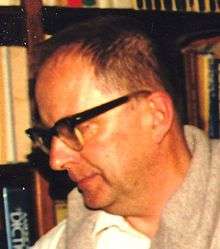Bohdan Paczyński
| Bohdan Paczyński | |
|---|---|
 | |
| Born |
February 8, 1940 Vilnius, Lithuania |
| Died |
April 19, 2007 (aged 67) Princeton, New Jersey, United States |
| Fields | Astronomy |
| Institutions |
Polish Academy of Sciences Princeton University |
| Alma mater | University of Warsaw |
| Doctoral advisor |
Stefan Piotrowski Włodzimierz Zonn |
| Notable awards |
Karl Schwarzschild Medal (1981) Eddington Medal (1987) Heineman Prize (1992) Prize of the Foundation for Polish Science (1996) Henry Draper Medal (1997) Gold Medal of the Royal Astronomical Society (1999) Bruno Rossi Prize (2000) Bruce Medal (2002) Henry Norris Russell Lectureship (2006) |
Bohdan Paczyński or Bohdan Paczynski (8 February 1940 – 19 April 2007) was a Polish astronomer notable in the theory of the stellar evolution, accretion discs, and gamma ray bursts.
Life
Paczyński was born on 8 February 1940 in Vilnius, Lithuania, to a lawyer and a teacher of Polish literature. In 1945 his family chose to leave for Poland and settled in Kraków, and then in 1949 in Warsaw. At the age of 18, Paczyński published his first scientific article in Acta Astronomica. Between 1959 and 1962 he studied astronomy at the University of Warsaw. Two years later he received a doctorate under the tutelage of Stefan Piotrowski and Włodzimierz Zonn.
In 1962 Paczyński became a member of the Centre of Astronomy of the Polish Academy of Sciences, where he continued to work for nearly 20 years. In 1974 he received habilitation and in 1979 became a professor. Thanks to his works on theoretical astronomy, at the age of 36 he became the youngest member of the Polish Academy of Sciences.[1]
In 1981 Paczyński visited the United States, where he gave a series of lectures at Caltech to former interns at his Warsaw-based institute. After the introduction of the Martial Law in Poland he decided to stay abroad. He was the Lyman Spitzer Jr. Professor of Astrophysics at Princeton University.
Paczyński was the initiator of Optical Gravitational Lensing Experiment (OGLE, led by Andrzej Udalski of Warsaw University Observatory) and All Sky Automated Survey (ASAS, created together with Grzegorz Pojmański).
His new methods of discovering cosmic objects and measuring their mass by using gravitational lenses gained him international recognition, and he is acknowledged for coining the term microlensing. He was also an early proponent of the idea that gamma-ray bursts are at cosmological distances.
His research concentrated on stellar evolution, gravitational lensing and gravitational microlensing, variable stars, gamma-ray bursts, and galactic structure.
In 1999, he became the first astronomer to receive all three major awards of the Royal Astronomical Society, by winning the Gold Medal, having won the Eddington Medal in 1987 and the George Darwin Lectureship in 1995.[2]
He was honoured with the title of doctor honoris causa by Wrocław University in Poland (on June 29, 2005) and Nicolaus Copernicus University in Toruń in Poland (on September 22, 2006).
In January 2006 he was awarded Henry Norris Russell Lectureship of the American Astronomical Society, "for his highly original contributions to a wide variety of fields including advanced stellar evolution, the nature of gamma ray bursts, accretion in binary systems, gravitational lensing, and cosmology. His research has been distinguished by its creativity and breadth, as well as the stimulus it has provided to highly productive observational investigations".
He died of brain cancer on April 19, 2007 in Princeton, New Jersey.[3]
Honors
Awards
- Karl Schwarzschild Medal of Astronomische Gesellschaft (1981)
- Eddington Medal (1987)
- Heineman Prize (1992)
- Henry Draper Medal of the National Academy of Sciences (1997)[4]
- Gold Medal of the Royal Astronomical Society (1999)[5]
- Bruno Rossi Prize (2000)
- Bruce Medal (2002)[6]
- Henry Norris Russell Lectureship (2006)[7]
Named after him
- Asteroid 11755 Paczynski
- Bohdan Paczynski Visitor program, Princeton University. Past scholars include Joachim Wambsganss (2008), Yasushi Suto (2009), Steven Balbus (2010)
See also
Notes
- ↑ (Polish) http://www.gazetawyborcza.pl/1,86024,4626294.html[]
- ↑ Trimble, Virginia (2007-07-20). "Professor Bohdan Paczynski". Obituary. The Independent on Sunday. Retrieved 2008-08-10.
- ↑ Pearce, Jeremy (April 26, 2007). Bohdan Paczynski, Pioneering Astrophysicist, Dies at 67. New York Times
- ↑ "Henry Draper Medal". National Academy of Sciences. Archived from the original on 26 January 2013. Retrieved 24 February 2011.
- ↑ "Winners of the Gold Medal of the Royal Astronomical Society". Royal Astronomical Society. Retrieved 24 February 2011.
- ↑ "Past Winners of the Catherine Wolfe Bruce Gold Medal". Astronomical Society of the Pacific. Retrieved 24 February 2011.
- ↑ "Grants, Prizes and Awards". American Astronomical Society. Archived from the original on 22 December 2010. Retrieved 24 February 2011.
External links
- Bohdan Paczynski's web page
- (Polish) Bohdan Paczyński awarded with the title of doctor honoris causa by Wrocław University
- Bohdan Paczynski's memorial at findagrave.com